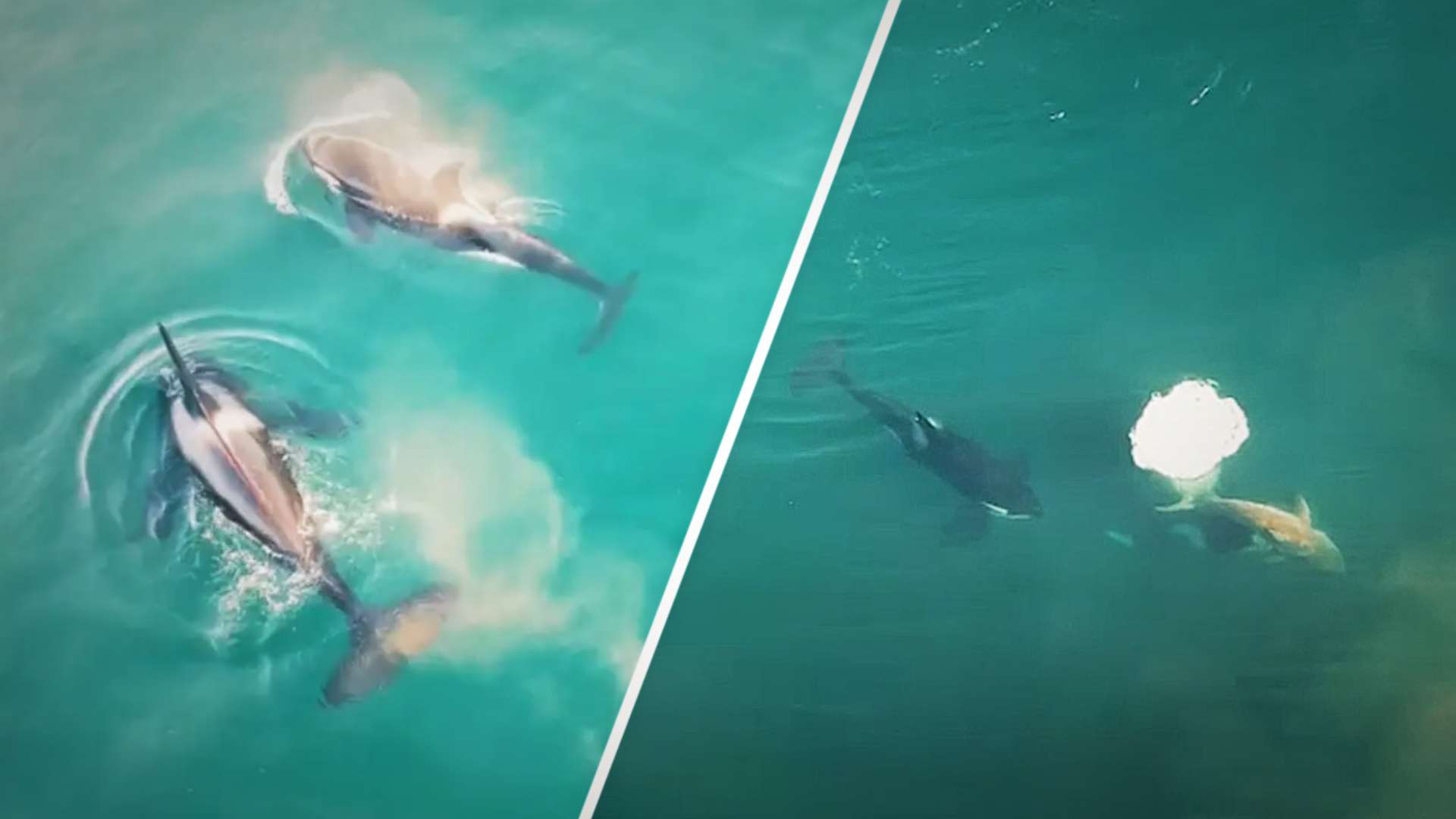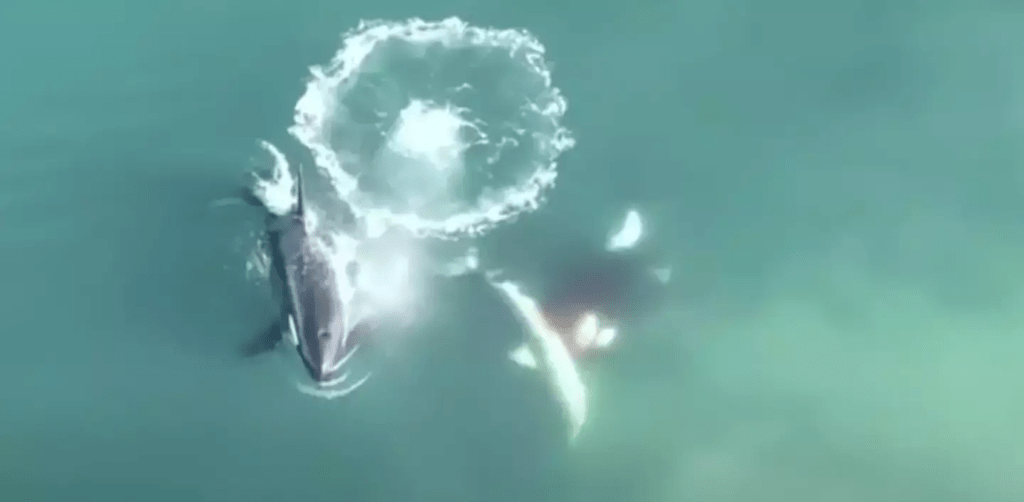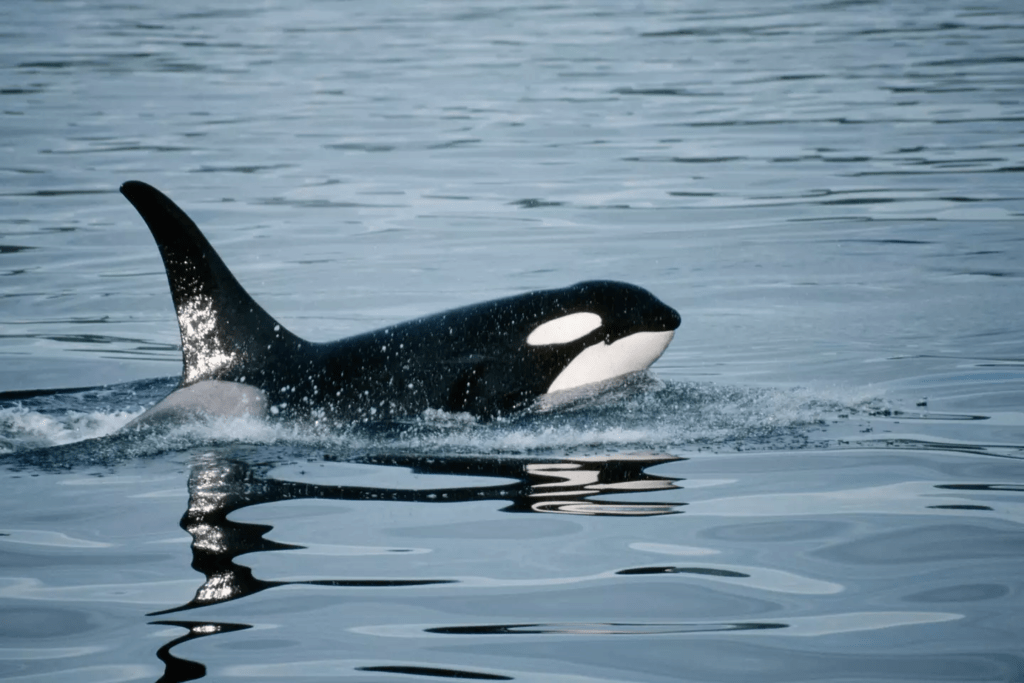Unprecedented Aerial Footage Reveals Orcas Hunting Great White Sharks: Nature’s Terrifying Battle for Survival

The Ocean’s Dark Side
Have you ever found yourself wishing for a break from the routine? Perhaps feeling overwhelmed by the endless cycle of to-do lists, meetings, and deadlines? Well, it’s time for a wake-up call — courtesy of Mother Nature herself. If you’re in need of a good reminder of the raw realities of life on this planet, we have something that might just do the trick.
Forget about the mundane worries of everyday life, like missing your morning coffee or accidentally leaving the stove on. Step into a world where survival isn’t just a matter of forgetting the milk; it’s a battle for life against some of the most terrifying predators on Earth. That’s exactly what you’ll see in a remarkable piece of footage that captures one of nature’s most chilling predator-prey dynamics: killer whales attacking and killing great white sharks.
A New Chapter in Predator-Prey Dynamics
If you think sharks are the undisputed kings of the ocean, think again. The world of apex predators has been dramatically altered, thanks to the intelligence and hunting prowess of orcas — better known as killer whales. This ground breaking footage, captured in Mossel Bay, South Africa, back in May 2022, is some of the most detailed and stunning footage ever recorded of this phenomenon. And yes, it’s just as terrifying as it sounds.
The footage, filmed from an aerial perspective, shows a particularly vicious pod of orcas hunting and attacking great white sharks, turning the food chain upside down. Orcas, which are usually thought of as apex predators, have now been observed targeting great whites with deadly precision, a behaviour that has only recently been captured in such detail.

Meet Starboard: The Orca Who Took Down Sharks
One of the key players in this chilling attack is an orca named Starboard. Known for her notorious shark-hunting abilities, Starboard was joined by her hunting companion, Port, in this dramatic hunt. Together, they are known to target great white sharks with remarkable strategy and coordination.
Starboard’s reputation is well-earned, as she’s responsible for some of the most documented shark kills in the area. But the true shocker is that Starboard and her pod have managed to target these once-feared predators with increasing success. In fact, the behaviour of these orcas has been evolving, with Starboard being at the forefront of this shift in predation.
The First Aerial Footage: A Game-Changer for Marine Science
While scientists have known about orca attacks on sharks for some time, this particular footage is the first of its kind to provide such intimate details of these attacks — and from an aerial perspective no less. The Ecological Society of America was responsible for publishing this landmark footage, which highlights the complexity of orca hunting tactics and how they’ve adapted to overcome the mighty great white.
Lead author Alison Towner, a senior shark scientist at the Marine Dynamics Academy in Gansbaai, South Africa, expressed how ground breaking this footage is for marine biology. She stated, “This behaviour has never been witnessed in detail before, and certainly never from the air.”
This is a huge leap in understanding orca behaviour. These social and highly intelligent creatures have long been known to hunt in groups. However, this footage shows the kind of strategic hunting that could change the way we think about their intelligence and their role in marine ecosystems.
Orcas: The Smartest Predators in the Ocean
Orcas are no ordinary marine mammal. These creatures are highly intelligent, social, and capable of complex behaviours that put them at the top of the food chain. Marine mammal expert and study co-author Dr. Simon Elwen, Director of Sea Search and a research associate at Stellenbosch University, elaborated on the orcas’ group hunting methods, which make them incredibly effective predators.
Unlike many other predators, orcas use a combination of communication, cooperation, and cunning to bring down their prey. This collective intelligence allows them to tackle creatures as formidable as great white sharks — creatures that, for years, were thought to be the undisputed rulers of the ocean.
The Rise of Solo Orca Attacks on Sharks
In 2022, a remarkable event was reported by New Scientist: for the first time ever, an orca was observed taking down a great white shark all on her own. This solitary kill marked a significant change in orca hunting strategy, as it shows that these apex predators no longer need to hunt in large groups to be successful. This shift in behaviour has had profound implications on shark populations.
For decades, orcas typically hunted in packs to bring down their prey. However, the new trend of solo hunting challenges that old understanding, suggesting that individual orcas have become more efficient at taking down sharks without the need for a team effort.
The Impact on Great White Shark Populations
While these attacks may be impressive from a scientific perspective, they’ve also had far-reaching consequences for marine ecosystems. Reports from The Guardian suggest that orca predation has had a devastating effect on great white shark populations in South Africa.
Gansbaai, a once-thriving shark habitat with a population of around 1,000 sharks a decade ago, has seen a dramatic decline in its great white population. Orcas have either killed off many of the sharks or forced the survivors to flee the region in search of safer waters. This disruption has caused a ripple effect throughout the ecosystem, as great whites play a crucial role in maintaining the balance of marine life.

Social Media Reactions to the Killer Whale vs. Great White Shark Footage
The footage of orcas hunting great white sharks has taken social media by storm. As people across the globe witness this stunning (and terrifying) spectacle, reactions have been pouring in from all corners of the internet. From awe and admiration to sheer disbelief, the viral spread of this video has ignited conversations about the power and intelligence of killer whales. Here’s a roundup of some of the best reactions and social media posts:
Twitter Reaction:
“Just watched the world’s first aerial footage of killer whales hunting sharks… Nature is officially scarier than I thought. 🤯 #KillerWhales #Sharks #Nature”
— @OceanLover123
This tweet captured the general shock and fascination many users felt after watching the footage. Twitter has been buzzing with discussions about how orcas are turning the tables on sharks, a conversation that often revolves around the power dynamics in marine ecosystems.
Instagram Post:
“Nature is full of surprises! Who knew orcas could take down great whites?! This footage is mind-blowing. 🌊🐋 #OrcaPower #SharkAttack #WildlifeWatch #OceanPredators”
— @WildlifeExplorer
Instagram users have shared the footage, with captions marveling at the killer whales’ hunting prowess. Many have been tagging wildlife conservation organizations to discuss the ecological implications of this shift in predator behavior. It’s clear that social media is not just captivated by the visual spectacle but also interested in the scientific and environmental impacts of these predator-prey dynamics.
Facebook Discussion:
“Did anyone else watch the killer whales hunting sharks? Absolutely terrifying but so fascinating at the same time. Orcas are clearly the true kings of the ocean! 🦈🐋 #ApexPredators #OrcaVsShark #MarineLife”
— MarineLifeWorld
On Facebook, people are starting deeper conversations about marine life. One post particularly caught attention as users debated whether orcas should be considered the ultimate apex predator, given their evolving hunting methods and intelligence. It’s becoming clear that orcas are challenging the traditional narrative of the food chain.
What’s the Bigger Picture?
As these social media posts reflect, the viral nature of this footage has brought a wider public awareness of the incredible intelligence and strategy of orcas. Whether you’re a fan of wildlife or simply a curious onlooker, it’s clear that this new understanding of orca behaviour is resonating with many.
For further discussion and insights into orca behaviour and marine ecosystems, check out the full coverage of this study:
- National Geographic: Orcas’ Hunting Intelligence
- Twitter Trends on Killer Whales vs. Sharks
- Facebook Community: Marine Life Discussions
What Does This Mean for Marine Ecosystems?
The decline in great white sharks is not just a loss for shark enthusiasts; it has wider ecological implications. Great whites are apex predators themselves and are integral in controlling the populations of other marine animals. Without them, the balance of marine ecosystems could be thrown off, leading to unpredictable consequences.
However, the increasing frequency of orca attacks on sharks is part of a larger trend that seems to be happening globally. This shift in predator-prey dynamics is a clear indicator that marine ecosystems are in flux, and scientists are only beginning to understand the long-term effects of these changes.
Conclusion: A Wake-Up Call from the Ocean
After watching this footage, you might find yourself feeling thankful that you don’t live in the ocean — where life is defined by constant survival battles, where apex predators lurk around every corner. But while it’s terrifying to witness these brutal interactions, it’s also a reminder of how intricate and interconnected the natural world is.
Thanks to this incredible footage, we are now witnessing a new chapter in predator-prey dynamics — one where orcas are claiming their dominance over the ocean’s greatest predators. And while it might seem like a scary thought, it’s just another reminder that in nature, every creature must fight to survive.
Featured Image Credit: Sea Search Research and Conservation






